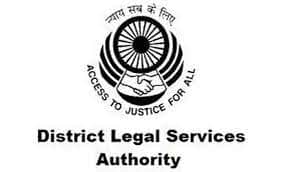About District Legal Services Authority:
- It is formed under Legal Services Authorities Act, 1987 to provide free legal aid and services to the weaker sections of this society to make sure that opportunities for securing justice are not denied to any citizen because of economic or other disabilities.
- It is a statutory body organized at the district level to provide effective monitoring of legal aid programmes and their composition.
- Legal Services Authorities are statutory bodies that are formed or constituted in the various states of India by the Legal Services Authorities Act, 1987.
- Constitutional provision:
- Article 39-A: Deals with the provision of providing free legal services to the citizens of India.
- The provision applies to the citizens if they are unable to bear the expenditure of legal services. It also helps the defendant in a case by appointing a lawyer to act for him in legal aspects.
- Composition of DLSA
- It is a body that shall be constituted by the State Government in consultation with the Chief Justice of the High Court.
- The act provides that a District Authority requires the district judge as its chairman.
- It shall also consist of a number of other members who have the experience and qualifications as prescribed by the State Government.
- The members possessing such requirements may be nominated by the Government in consultation with the Chief Justice of the High Court.
- The person to be appointed shall belong to the State Judicial Service not lowers than rank than that of a Subordinate Judge or Civil Judge posted at the seat of the District Judiciary as Secretary of the District Authority.
- The Assistant Commissioner of the concerned District acts as the Member Secretary of the District Authority.
- The officers and other employees of the District Authority are entitled to salary and allowances and shall also be subject to such other conditions of the services as the State Government in consultation with the Chief Justice of the High Court prescribes
Q1) What are statutory bodies?
Statutory bodies are organizations or institutions that are established and governed by specific legislation or laws enacted by the government. These bodies are typically created to perform specific functions, provide essential services, regulate industries or sectors, or oversee certain aspects of public administration.
Source: District Legal Services Authority West Tripura organizes Door-to-Door Legal Aid Campaign
Last updated on June, 2025
→ UPSC Notification 2025 was released on 22nd January 2025.
→ UPSC Prelims Result 2025 is out now for the CSE held on 25 May 2025.
→ UPSC Prelims Question Paper 2025 and Unofficial Prelims Answer Key 2025 are available now.
→ UPSC Calendar 2026 is released on 15th May, 2025.
→ The UPSC Vacancy 2025 were released 1129, out of which 979 were for UPSC CSE and remaining 150 are for UPSC IFoS.
→ UPSC Mains 2025 will be conducted on 22nd August 2025.
→ UPSC Prelims 2026 will be conducted on 24th May, 2026 & UPSC Mains 2026 will be conducted on 21st August 2026.
→ The UPSC Selection Process is of 3 stages-Prelims, Mains and Interview.
→ UPSC Result 2024 is released with latest UPSC Marksheet 2024. Check Now!
→ UPSC Toppers List 2024 is released now. Shakti Dubey is UPSC AIR 1 2024 Topper.
→ Also check Best IAS Coaching in Delhi
























